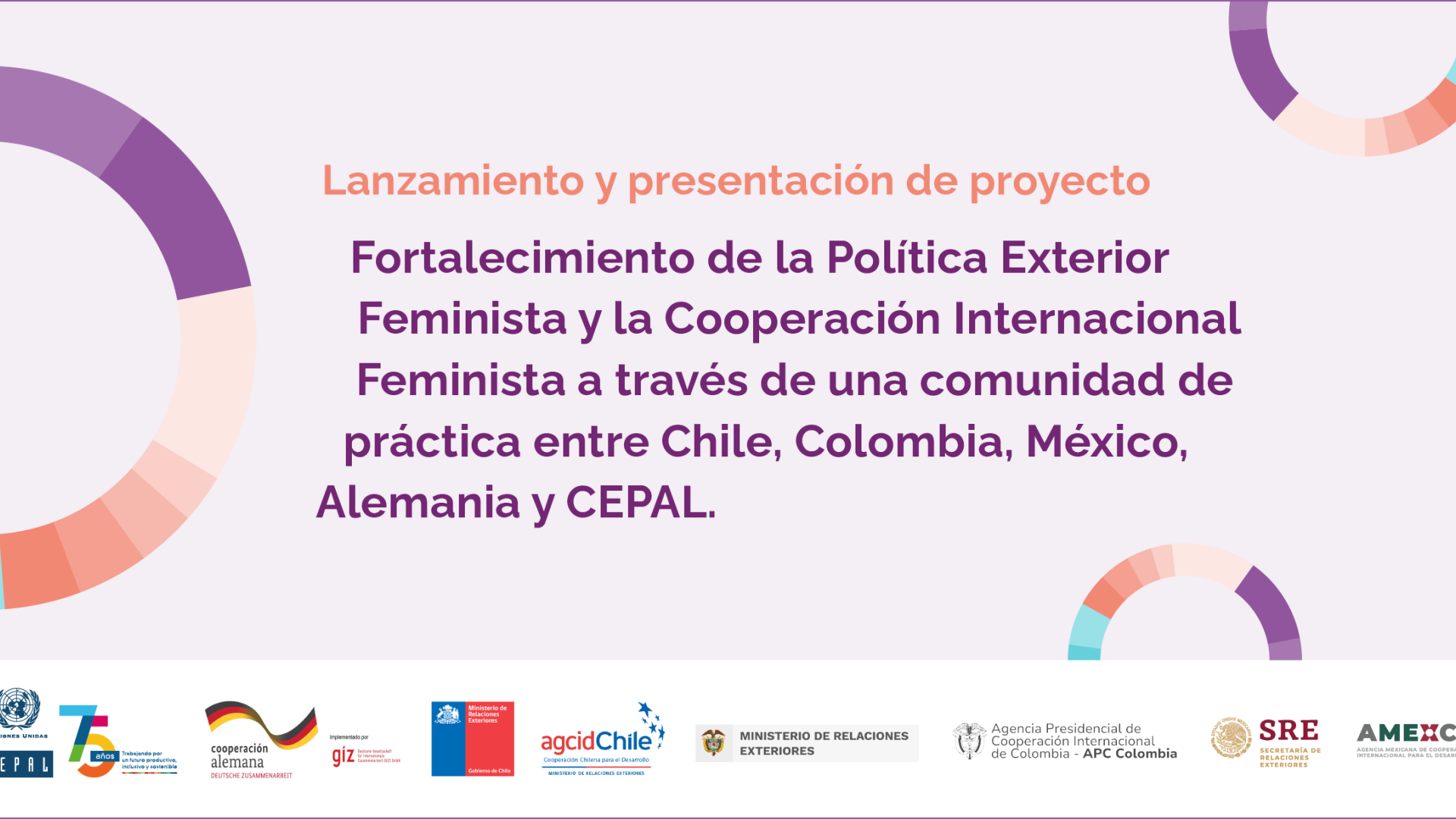News
The intergovernmental meeting was held at ECLAC headquarters and brought together representatives of the countries of the region, the United Nations system and regional and international organizations. The meeting assessed and reviewed opportunities for international cooperation for development in terms of multi-stakeholder strategies, especially with a view to the Summit of the Future to be held in September 2024, and reported on the project "Strengthening Feminist Foreign Policy and Feminist International Cooperation through a community of practice between Chile, Colombia, Mexico, Germany and ECLAC" presented during the 25th ECLAC meeting, which took place at ECLAC headquarters, Colombia, Mexico, Germany and ECLAC". The project proposal was presented during the 25th call of the Regional Fund for Triangular Cooperation in Latin America and the Caribbean of BMZ/GIZ. The same was then launched in Salvador de Bahia in May, in the context of the VII Regional Conference on Trilateral Cooperation with Latin America and the Caribbean 2024: "Overcoming Obstacles, Building Bridges".
The event was inaugurated by the Secretary of the Economic Commission for Latin America and the Caribbean (ECLAC), Luis Yáñez - on behalf of the Executive Secretary, José Manuel Salazar-Xirinachs - and by the Director General for International Cooperation of the Ministry of Foreign Affairs, International Trade and Worship of Argentina, Mateo Estremé, in his capacity as the country's Chairman of the Presiding Officers of the Conference. Among the high-level officials who attended the event were representatives from Brazil, Chile, Colombia, Costa Rica, Cuba, Dominican Republic, Ecuador, Germany, Guatemala, Mexico, Spain and Uruguay and the Dominican Republic.
In this context, the Director of ECLAC's Division for Gender Affairs, Ana Güezmes, reported on the project "Strengthening Feminist Foreign Policy and International Feminist Cooperation" (CoPEF), focusing on three main points: the intergovernmental framework within which the initiative was developed, the sense of urgency that brought the project into fruition, and its four lines of action.
At the intergovernmental level, she stated that the countries of Latin America and the Caribbean recognize that South-South and triangular cooperation is fundamental to face the challenges of sustainable development without leaving anyone behind. This is even more important considering the cascading crisis that had an impact on the progress the region had been making towards the Sustainable Development Goals, and the consequences of the pandemic, which deepened structural gender inequalities. In this way, the Director recalled the words of the Executive Secretary of ECLAC, pointing out that it is necessary a sense of urgency to act, raising the level of ambition and scale of joint and collaborative efforts, especially those that the region already has. In this regard, she noted that Latin America and the Caribbean is the only region in the world that has a Regional Conference on Women in Latin America and the Caribbean, a subsidiary body of ECLAC, where member States have approved a Regional Gender Agenda, which has been built on multi-stakeholder efforts, with the participation of civil society, women's organizations, feminists, academia and an increasing number of international partners. To this she added that specifically at the last Regional Conference on Women, the countries had agreed in the Buenos Aires Commitment to promote subregional, regional and multilateral cooperation programs through North, South and Triangular cooperation modalities, with the objective of advancing in the region's development. In addition, she indicated that at the First Meeting of the Regional Conference on South-South Cooperation in Latin America and the Caribbean held in May 2023, the Presiding Officers adopted in Resolution 1(I), that the subsidiary bodies of ECLAC strengthen synergies in the areas related to bilateral, multilateral, South-South, triangular and humanitarian cooperation, sustainable development and gender equality, particularly in the identification of common criteria to guide the evaluation and assessment of these cooperation modalities, as well as their impacts.
She indicated that the triangular CoPEF project emerged in this context, as a community of practice among the three countries in the region that currently have a Feminist Foreign Policy. Thus, Chile, Colombia and Mexico (last two policies available in Spanish), together with Germany and ECLAC, joined efforts to submit this proposal to the BMZ/GIZ Regional Triangular Cooperation Fund, with the aim of advancing strategies to achieve substantive equality. The project aims to strengthen the capacities of both the Ministries of Foreign Affairs and the international development cooperation agencies in the design and implementation of this type of policy, which will enable all the countries of the region to move towards gender equality through collective learning.
In order to achieve this goal, the project has four components. The first consists in developing institutional structures within the foreign ministries and political, regulatory and operational frameworks, under the leadership of Chile. The second component is related to the development of guidelines, directives, practices and methodologies, in charge of the four countries, which will be gathered in a community of practice managed by ECLAC. A third component, led by Colombia, comprises training of public servants and aims to generate an understanding of what is meant when the concept of gender equality is used within the public sphere. Finally, a fourth component of action in charge of Mexico relates to data, which aims to advance measurements with a gender perspective, for example, by establishing comparable indicators on women in diplomatic careers or in international negotiations. Considering the above, the Director of ECLAC’s Division for Gender Affairs said that the CoPEF project represents a milestone for ECLAC, BMZ/GIZ and partner countries, as it is the first triangular cooperation measure on gender equality and feminist cooperation, with a response developed from the Global South. This was presented as a groundbreaking initiative due to it is a triangular cooperation based on the principle of horizontality between partners, which in a certain sense is more circular than triangular, since Germany will participate both through the alliance with BMZ/GIZ and ECLAC, but also in a liaison role with the Ministries involved. Another key point highlighted was that the project not only seeks to contribute to countries that currently have a Feminist Foreign Policy, but also to be a voice from the Global South that can serve as an inspiration to others that decide to initiate this transformation.
Finally, the Director of ECLAC's Division for Gender Affairs recalled the development of a guide for gender mainstreaming in statistical production, in the context of the Conference on Statistics at the SCA and the recent decision on gender mainstreaming in the Escazú Agreement at the last COP. Likewise, within the framework of the CoPEF project and in accordance with these advances and with what was previously discussed at the First South-South Cooperation Conference in 2023, the idea of advancing towards an Action Plan on gender mainstreaming in international development cooperation was raised, which would help to orient the entire project cycle – including the stages of formulation, implementation, monitoring and evaluation, and the development of data and information systems.
Following the Director's speech, the delegates approved a six-point agreement, in accordance with the discussions held during the encounter. Regarding the quantification of South-South cooperation to mobilize funds for the Sustainable Development Goals, the Presiding Officers agreed that this measurement should be led by UNCTAD. On the other hand, it was requested that ECLAC prepare an Action Plan for gender mainstreaming in international development cooperation programs and projects. This document should include an analysis and assessment of South-South and triangular cooperation, in synergy with the measurement led by UNCTAD. In addition, it should include multi-stakeholder strategies for cooperation, with the objective of serving as input for the Second Meeting of the Regional Conference on South-South Cooperation in Latin America and the Caribbean, to be held in 2025.
It should be noted that the preparation of the Action Plan on gender mainstreaming in international development cooperation will also contribute to the III Ministerial Conference on Feminist Foreign Policies (Mexico, 2024) and the XVI Regional Conference on Women in Latin America and the Caribbean (Mexico, 2025).
Related links:



